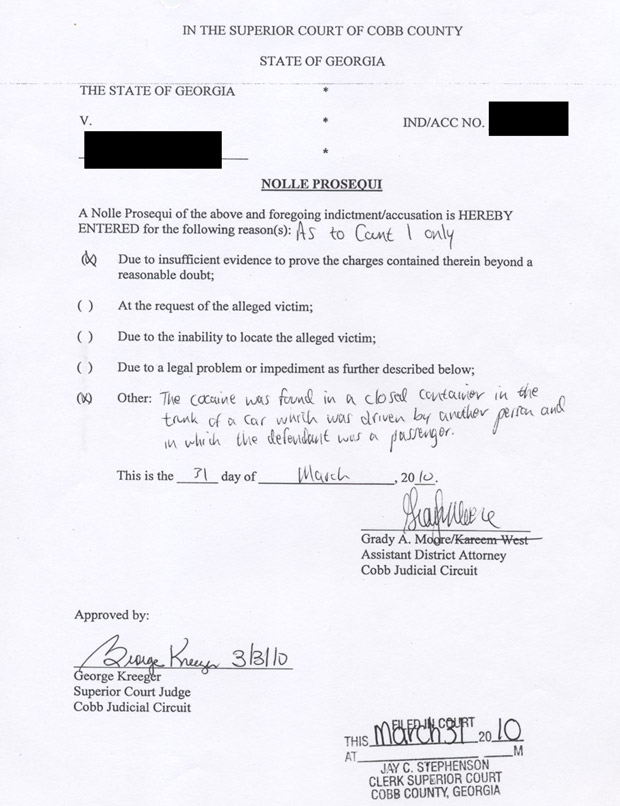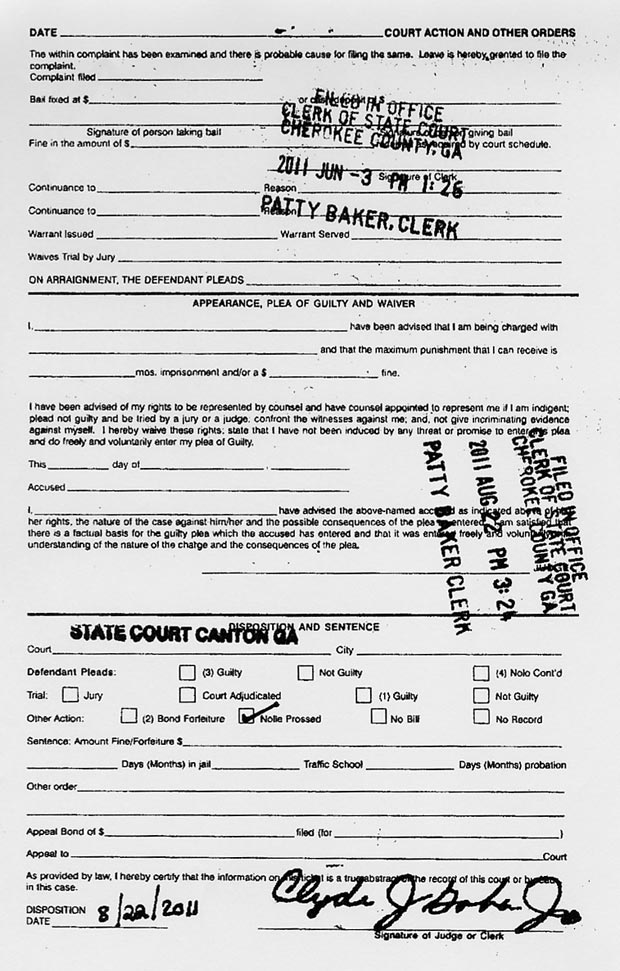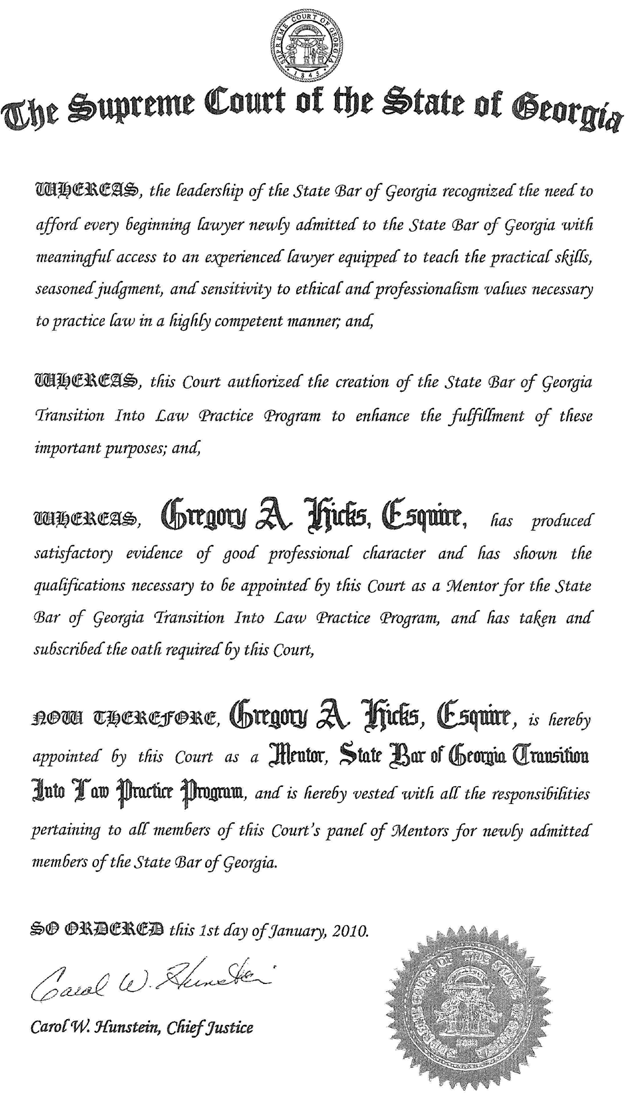Felony Cocaine Charge Dismissed in Cobb County

Law Office of Gregory A. Hicks
Attorneys serving Cherokee, Cobb and surrounding counties

Gregory A. Hicks obtains a dismissal of a DUI Ticket before it is even filed. This is an unusual event in Cherokee County.

Cherokee County DUI Ticket Dismissed
Gregory A. Hicks secured dismissals of DUI less safe and DUI drug charges in the State Court of Cherokee County in April 2011. Mr. Hicks’s client was arrested in his own driveway for DUI. The client submitted to the State administered test of his breath (the “intox” test) and registered .078–BELOW the legal limit in Georgia. Despite his low intox result, and despite the absence of any “less safe driving”, deputies with the Cherokee County Sheriff’s Office charged the client with DUI Less Safe.
Mr. Hicks was able to obtain the dismissals on the day the case was called in for trial. After reviewing the evidence, Mr. Hicks discovered that the officers improperly administered the Field Sobriety Tests–making the client submit to tests that he was physically incapable of doing correctly. The officers also improperly read implied consent to Mr. Hicks’s client. The deputies read implied consent prior to placing the client under arrest which is strictly prohibited under Georgia DUI law. Mr. Hicks filed motions to have this improper evidence excluded from trial. After filing motions and discussing with the prosecutors, the state agreed to dismiss the DUI charges against the client without the need for trials or motions. Because of Mr. Hicks’s knowledge and expertise of DUI law in Georgia, his client avoided jail time, an expensive fine and the harsh consequences of a DUI conviction.
Gregory A. Hicks has obtained dismissals on the last 2 DUI cases in Cherokee County and Cobb County without trial or motions hearings.
In the State Court of Cherokee County, Mr. Hicks’ client was charged with DUI less safe after he refused the breath test. After Mr. Hicks investigated the case and brought it to the attention of the prosecutor that the officer improperly administered field sobriety tests on the side of the road (including making his client engage in made up tests), attorneys for the state chose not to reduce the DUI charge, but to completely dismiss the charge. Thanks to Mr. Hicks’ experience and advocacy, his client now maintains a clean driving record.
A similar situation occurred in Cobb County, Georgia. Mr. Hicks’ client was a young girl, 19 years old. She was stopped for speeding after an officer “paced” or followed her car. After mistaking tobacco in the car for marijuana, the officer immediately pulled her out of the car and started a DUI investigation. Again, as often happens, the officer did not administer the field sobriety tests properly. When Mr. Hicks brought this to the attention of the prosecutor, the state offered to reduce the DUI charge to reckless driving. The client, however, would have still lost her license if she pled to reckless driving because she was under the age of 21 (in addition to the numerous other consequences of a reckless driving conviction, including increased insurance premiums, higher fines and probation). Mr. Hicks was unwilling to accept this result so he went up the chain of command in the prosecutor’s office until he secured a complete dismissal of the DUI charge.
Both cases are a testament to how an attorney experienced in DUI law and trained in how officers should properly conduct DUI investigations can be crucial to your case.
Gregory A. Hicks represented a client in a 3-week criminal trial in Cobb County, Georgia. In this “street gang” murder trial, Gregory Hicks appeared on WSB-TV in his opening statement exposing how desperate the prosecution must be that one defendant receives a lesser sentence for his testimony in the case.
Gregory Hicks was often quoted for his statement to the jury that “Muhammed Abdus-Salaam will be auditioning for his future.”
Gregory Hicks was also critical of the negligent investigation of the case and failure to determine the one and only shooter.
A partial transcript of Gregory Hicks’ opening statement follows:
In this case there will be no evidence that [my client] shot anybody. There will be no evidence that [my client] shot at anybody. There will be no evidence that [my client] was even inside the apartment complex. There will be no evidence that [my client] assaulted anybody. There will be no evidence that [my client] even knew anybody that was involved in the case. There is no evidence that [my client] made any plan with anybody to kill anybody or assault anybody.
But what evidence there will be is that this case is going to be personal to Muhammed Abdus-Salaam,[ the government snitch]. Personal to him factually and legally.
Factually, he is the one person — the evidence will show that the government snitch is the instigator of all of this that lead to this innocent young man’s death. He is the one that got disrespected by drug dealer, got disrespected when he tried to do a deal with the drug dealer with his brother. The drug dealer wound up not doing the deal, went away cussing and disrespecting Muhammad Abdus-Salaam. Shamed him in front of his own brother. He’s the only one. This is personal to him. That’s why he went over there. It was his idea to do it.
But yet the instigator is not on trial here today. Instead, what the government snitch gets to do is audition for his freedom. He gets to get on the stand and minimize his conduct with all the pressure on him of his future freedom. His choices are life in prison or freedom. Think about that as he testifies.
You’re able, as Judge Ingram told you, you’re the judge of his credibility. He’s the — Muhammad Adbus-Salaam is the only one that wanted revenge, but yet the State is not electing to prosecute him. Instead, he gets to show them what he can do for them. He’s up here. His job is going to be, the evidence will show you, to convict all these people here. And after he does that, make no mistake about it, he will get his reward.
Remember this about his statements. The District Attorney told you when he’s first confronted about this, when his name instantly popped up in the case and when he is confronted about it, he denies the whole thing. Okay. The detectives leave him alone.
They go back to him later and try to get another statement from him. Early on in that interview, the detectives tell him that we can help you when you help us. It becomes a different story after that. He goes and names all these other people. But he doesn’t even get arrested then.
But what the situation with Muhammad Abdus-Sallam is, his reward is going to be hidden from you until after the trial. He doesn’t have to sit here, be on trial, and come up and testify to the truth when it’s his turn. He does not have to face you. He gets to sit up here and talk this way.
Why the District Attorney chose him to reward, I don’t know. Especially when all — every miniscule piece of evidence is going to say that he’s the instigator. Without him and his desire to either rob or get revenge on Dylan Wattecamps, another drug dealer — actually, they are both drug dealers, Muhammad, Abdus-Salaam and Dylan Wattecamps. Without that, young [name withheld], J.B., would still be here among us. But yet, he gets his reward hidden.
And I also expect the evidence to show you that he’s already received his instructions from the District Attorney about what he is supposed to do. The District Attorney has told him not to testify truthfully but to testify against. It’s a matter of record that it’s been stated to Muhammad Abdus-Salaam you are going to get up there and testify against. So he knows what his job is if he wants to earn his freedom. And you have to take that into consideration in everything you’re supposed to do.
Now, I expect that the judge will tell you that the words of somebody else that is involved in the case is not sufficient. That’s not enough. Especially when you consider everything that he has to gain. He’s trying to salvage his life. He’s not up here for money. There is no evidence that somebody has offered him a thousand dollars to do it. He’s up here for his life.
He will have a choice. It is about choices. It is about Muhammad Abdus-Salaam’s choices. His choice is his freedom or get up there and make sure he says what he’s supposed to say against, as the District Attorney told him, all of these people.
Thank you, folks.
Gregory A. Hicks obtains 2 dismissals in Pickens County Superior Court. Methamphetamine possession charge – dismissed. Forgery and theft charges – dismissed.
Mr. Hicks’s client was facing a Life Sentence Armed Robbery case combined with a drug case. Due to the defendant’s recidivist (repeat offender) status, a life sentence would have been imposed. This case involved multiple similar transactions (or prior crimes the prosecution attempted to inject into this case), a sellout co-defendant, a victim that only spoke Spanish, a very unsympathetic defendant, DNA evidence analyzed in Virginia, and multiple pre-trial motions. After 2 days of trial, the District Attorney dismissed the Armed Robbery charge, thereby literally saving the defendant’s life.
In this case, the victim, a Hispanic man in his 70s was beaten by a shotgun and left for dead. The Cherokee County Sheriff’s Office and District Attorney, without conducting a full investigation, decided it was done by my client and not [name withheld] and sold out to the real perpetrator for his testimony against my client. My independent investigation shows the victim’s description to be a better fit to the clothes worn by [name withheld] rather than my client.
My cross-examination of the victim had him saying the culprit was everybody under the sun other than my client. All the DA has was [name withheld]. She gave up.
This case shows that fighting for clients requires hard work and time.
The Honorable Carol W. Hunstein, Chief Justice of the Supreme Court of Georgia, appointed Gregory A. Hicks to serve as a Mentor for the State Bar of Georgia’s Transition into Law Practice Program. Mr. Hicks’s appointment is for a one year term beginning January 1, 2010.
The Transition into Law Practice Program fosters young attorneys by pairing them with an experienced attorney as a mentor “to teach the practical skills, seasoned judgment, and sensitivity to ethical and professionalism values necessary to practice law in a highly competent manner.” In order to be appointed as a Mentor by the Supreme Court, an attorney must maintain a professional reputation for competence, ethical and professional conduct.
The Chief Justice’s appointment of Mr. Hicks as a mentor is a testament to Mr. Hicks’s experience and respect in the legal community.

Gregory A. Hicks and Amanda R. Gaddis appeared before the highest court in Georgia on February 9, 2010 to argue that a murder conviction from Cobb County should be overturned.
In Willis v. State, Ms. Gaddis argued that because her client properly invoked his right to have an attorney present during police questioning, statements he later made to police should not have been admitted at his trial. Ms. Gaddis further argued that statements her client made two days later were also improperly admitted because the statements were made to a clergyman for the purpose of seeking spiritual guidance and were thus privileged statements under Georgia law.
Gregory A. Hicks later responded to arguments set forth by attorneys for the State of Georgia. Mr. Hicks urged the court to overturn the conviction based on recent case law from Georgia’s Supreme Court.
Copyright © 2011 Gregory A. Hicks